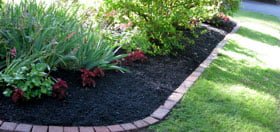 Mulch can be organic or inorganic. Organic mulches include any formerly living material such as bark chips, chopped leaves, straw, grass clippings, compost, wood chips, shredded bark, sawdust, pine needles, rice hulls, saw dust, grape pomace and even paper. Inorganic mulches include gravel, stones, black plastic sheeting, rubber chips and geotextiles (landscape fabrics).
Mulch can be organic or inorganic. Organic mulches include any formerly living material such as bark chips, chopped leaves, straw, grass clippings, compost, wood chips, shredded bark, sawdust, pine needles, rice hulls, saw dust, grape pomace and even paper. Inorganic mulches include gravel, stones, black plastic sheeting, rubber chips and geotextiles (landscape fabrics).
Both types of mulch discourage weeds but organic mulch improves the soil as it decomposes. Inorganic mulch doesn’t break down or enrich the soil.
If you want a permanent mulch and do not add plants to the garden every year an inorganic mulch may be a good choice for you. But if you add plants, or even just move them around a black plastic sheet would be a nuisance and rocks would make it very difficult to plant.
Organic mulch:
- breaks down slowly and adds nutrients to the soil giving you healthier plants
- prevents most weeds from germinating
- reduces the need to water, keeps the soil cool and most
- keeps dirt from splashing on flowers and vegetables
- reduces erosion and helps the soil absorb more rain
- reduces soil-borne diseases caused by splashing rain or irrigation water
- eliminates soil crusting which can make it harder for seeds to germinate and rain to penetrate
- helps roots develop better and extend farther due to improved water retention



